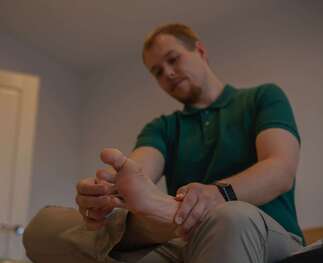|
What is it? Plantar fasciitis is a common condition of the foot and heel affecting both athletes and members of the general public. The plantar fascia is a fibrous band of tissue that attaches to the base of the heel and supports the muscles and arch on the base of the foot. When the plantar fascia becomes chronically irritated, it is referred to as plantar fasciitis. What are the symptoms?
Plantar fasciitis is characterised by pain at the base of the heel. It is often noticed getting up in the morning, when people take their first steps of the day. The pain may settles down after walking around, then reappear after sitting for a while and getting up again. Pain can usually be reproduced when the inside of the heel is pressed, and the calf muscles might be noticeably less flexible. This condition can be diagnosed with a physical assessment by a physiotherapist. Left untreated, plantar fasciitis can lead to chronic heel pain, which can have a significant impact on quality of life, interfering with day to day activities. What are the causes? The plantar fascia supports the arch in the foot during weight-bearing and acts as a shock absorber. Small tears can appear in the fascia when it is exposed to excess tension and stress over time. While the exact cause is unknown, there are several risk factors that can increase the risk of this condition developing. These include obesity, excessive foot pronation (or "flat feet"), inadequate shoe support, prolonged standing and excessive running. It has previously been thought that plantar fasciitis is linked to or caused by heel spurs, however this has been shown to be untrue, and many people have heel spurs without any symptoms. How can physiotherapy help? The goal of physiotherapy is to reduce symptoms and support the fascia to reduce and repair any tissue damage. This is done through short term pain reduction strategies such as ice, rest, activity modification and gentle stretches. To help reduce the tension on the fascia, lower leg strengthening and balance exercises will be implemented along with orthotics and night splinting where indicated and in some cases, corticosteroid injections. A night splint can be helpful in keeping the calf muscles lengthened as they often rest in a shortened position overnight. Other treatment options include extracorporeal shockwave therapy and endoscopic plantar release. However, these interventions will also be coupled with physiotherapy treatment for best results. Patients who are not responding to physiotherapy and other conservative management may be candidates for surgical release of the plantar fascia.
2 Comments
|
Categories
All
|


